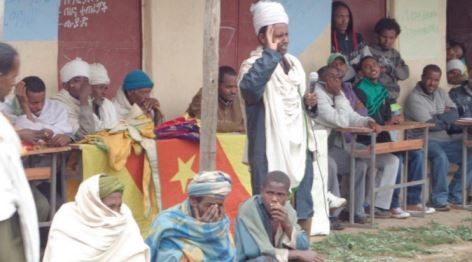- Work With USAID
- How to Work with USAID
- Organizations That Work With USAID
- Find a Funding Opportunity
- Resources for Partners
- Careers
- Get Involved
Speeches Shim

The overall goal of the project was to improve the food security status of chronically food insecure households in 9 Woredas (districts) of the Amhara Region of Ethiopia. Program activities included maternal and child health and nutrition, improving access to nutritious foods, improving access to water and sanitation (water schemes, toilets, hygiene behaviors), natural resources management (soil and water conservation, tree planting), improving access to social infrastructure (schools, health posts, veterinary posts), and food distribution.
Ethiopia has seen progress in the sanitation and hygiene sector during the past ten years, much of it achieved through the Government’s Health Extension Program. As part of this project, Food for the Hungry (FH) engaged local religious and community leaders to help sensitize and construct public latrines for the declaration of ‘Open Defecation Free’ (ODF) zones. For example, FH worked with Orthodox Church priests to reach out to their congregations on the importance of sanitation and hygiene. This resulted in the building of public toilets and the declaration of ODF zones. FH contacted the religious leaders in the target communities where ODF interventions were implemented and briefed them about open defecation issues and their consequences. In addition, ODF awareness raising orientation was provided for the traditional and religious leaders, as well as selected community members. These engagements assisted in convincing the leaders to promote and publicize ODF zones and their contribution towards ensuring total sanitation. People in public places, such as churches, often use surrounding bushes for defecation. Engaging religious and community leaders was critical to facilitate construction of public latrines, which contributed to reducing instances of open defecation. Furthermore, community leaders were actively involved in ODF celebrations, which helped persuade villagers to adopt and meet the ODF status. Their support was effective in ensuring messages were spread about latrine development and ODF zones.

Comment
Make a general inquiry or suggest an improvement.